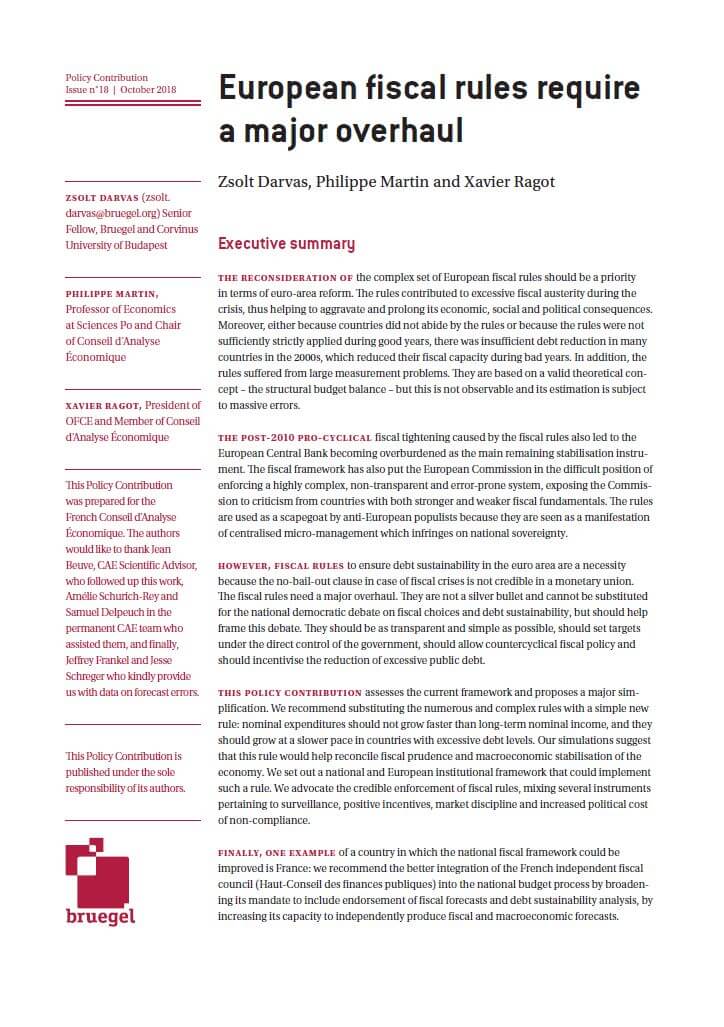Policy Contribution
European fiscal rules require a major overhaul
In this Policy Contribution prepared for the French Conseil d’Analyse Économique, the authors assess current European fiscal rules and propose a major simplification. They recommend substituting the numerous rules with a new simple one, which would help reconcile fiscal prudence and macroeconomic stabilisation of the economy.
This Policy Contribution was prepared for the French Conseil d’Analyse Économique.
The reconsideration of the complex set of European fiscal rules should be a priority in terms of euro-area reform. The rules contributed to excessive fiscal austerity during the crisis, thus helping to aggravate and prolong its economic, social and political consequences. Moreover, either because countries did not abide by the rules or because the rules were not sufficiently strictly applied during good years, there was insufficient debt reduction in many countries in the 2000s, which reduced their fiscal capacity during bad years. In addition, the rules suffered from large measurement problems. They are based on a valid theoretical concept – the structural budget balance – but this is not observable and its estimation is subject to massive errors.
The post-2010 pro-cyclical fiscal tightening caused by the fiscal rules also led to the European Central Bank becoming overburdened as the main remaining stabilisation instrument. The fiscal framework has also put the European Commission in the difficult position of enforcing a highly complex, non-transparent and error-prone system, exposing the Commission to criticism from countries with both stronger and weaker fiscal fundamentals. The rules are used as a scapegoat by anti-European populists because they are seen as a manifestation of centralised micro-management which infringes on national sovereignty.
However, fiscal rules to ensure debt sustainability in the euro area are a necessity because the no-bail-out clause in case of fiscal crises is not credible in a monetary union. The fiscal rules need a major overhaul. They are not a silver bullet and cannot be substituted for the national democratic debate on fiscal choices and debt sustainability, but should help frame this debate. They should be as transparent and simple as possible, should set targets under the direct control of the government, should allow countercyclical fiscal policy and should incentivise the reduction of excessive public debt.
This Policy Contribution assesses the current framework and proposes a major simplification. We recommend substituting the numerous and complex rules with a simple new rule: nominal expenditures should not grow faster than long-term nominal income, and they should grow at a slower pace in countries with excessive debt levels. Our simulations suggest that this rule would help reconcile fiscal prudence and macroeconomic stabilisation of the economy. We set out a national and European institutional framework that could implement such a rule. We advocate the credible enforcement of fiscal rules, mixing several instruments pertaining to surveillance, positive incentives, market discipline and increased political cost of non-compliance.
Finally, one example of a country in which the national fiscal framework could be improved is France: we recommend the better integration of the French independent fiscal council (Haut-Conseil des finances publiques) into the national budget process by broadening its mandate to include endorsement of fiscal forecasts and debt sustainability analysis, by increasing its capacity to independently produce fiscal and macroeconomic forecasts.














